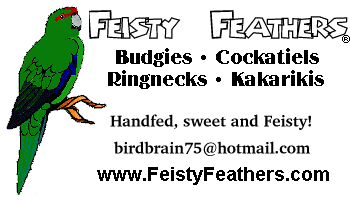

It wants to be with people.
There is a world of difference between tame and well-socialized. While I was at UC Davis I had an internship working with
their flock of orange-winged amazons. They were doing research to find out how much and what kind of handling chicks needed
to remain "tame." (I know it sounds silly, but then most university research is.) About half of the amazons were
tame but none were really well-socialized. A tame bird is just a bird that has been taught not to
fear people. A socialized bird is one that has been taught that people are friends. A bird that has been
well-socialized will want and seek out interaction with humans. It wonít just step up, it will walk over and do so. It
wonít hang out with you because you give it treats or a toy, it will hang out with you because it wants to be with you.
It knows how to be a bird.
Birds are not humans, they are birds. They may act like human children and even learn to speak our language but they are
still birds. They should know how to act like one, flying ability included (let handfeds learn this skill before clipping).
A well-socialized bird should know that it is a bird. The only problem should be in training the human to realize this.
It knows how to interact with other birds.
It will know birdy-language and have developed flock skills. Mirrors and isolation give birds horrible flocking skills.
My mitred conure, Fry, knows very well how to be a bird and act with people but he doesnít know how to react to other birds.
Birds with poor skills will either be overly aggressive and attack birds that get too close (like Fry) or will shun other
birds completely, act scared of them, and want nothing more than a human to come along and "rescue" them.
It is willing to try new things.
New toys arenít scarey, new foods are welcomed, new people are approached with ease. This is probably the hardest thing to
accomplish. Obviously no bird is going to do this perfectly. Some objects are going to be frightening, favorite foods will
always develop and maybe the bird wonít run to new people, but it will sit on them once you hand it over.
Reader Comments:
My additional comments are in this color.
My cockatiel, according to your
article, is well socialized. But an addition. Our bird TRUSTS us totally.
He may be afraid of a toy or food AT FIRST, but if I tap it and show
interest in it, he will watch attentively and you can almost see him
thinking "maybe it's not so bad even though it looks scary" and he'll
actually start checking it out, touching and tasting like I "showed" him.
I decided to try this once when he was afraid of new foods/toys thinking
this may be similar to what his parent may have done. I'm not sure if it
is, but the parents I would imagine show their offspring what's safe and
what's not, and in trying to imitate on that assumption, was pleasantly
surprised at the response!!! So we can show them NOT to be afraid.
(granted there are a few things he will always be afraid of like the
ringing doorbell and the plastic ball toy), but it was worked with many
things. So this is another difference with a socialized bird, the trust
that you are not going to harm him and will follow your lead.
Trust is indeed a key part in socialization. The behavior you describe is learning through example. Birds learn what to eat,
how to act, how to communicate, what is dangerous, what is safe, etc. from their fellow flock members. If a bird accepts you
as part of the flock, it will learn by your example. A well-socialized bird will hence accept change with greater ease.

All articles and images contained on this site are © 1998, 1999, 2000 by Feisty Feathers unless otherwise noted and may not be reprinted or used in any way without the author's permission.